- Home
- Kim Newman
Life's Lottery
Life's Lottery Read online
Life’s Lottery is copyright © 1999, 2003 by Kim Newman, all rights reserved. No part of this book may be reproduced in any form, by any means electronic or mechanical, without prior permission of the publisher, with the exception of brief passages quoted in reviews.
ISBN: 1-931305-93-5
Originally published in the United Kingdom in hardcover in 1999 by Simon & Schuster - ISBN: 0684840162, and in paperback by Pocket Books - ISBN: 0671015974
A Co-Publication of
http:www.crowstreetpress.com
http:www.scorpiusdigital.com
C O N T E N T S
Dedication
Getting Around in Life’s Lottery
Life’s Lottery
Acknowledgements
About the Author
Begin Again
Scorpius Digital Publishing Titles
Crow Street Press Titles
Dedication
If Napoleon, for Tom Tunney
If Illya, for David Cross
This is the story of a man who always made the wrong choice. He could have had either of two jobs; he picked the dead end. He could have married either of two women; he picked the nag. He could have invested in either of two businesses; he picked the one that went bankrupt. Finally, he decides to abandon his old life, to change his identity and start again. He goes to the airport and finds he can get on either of two flights; he chooses the plane with the engine that explodes over the Atlantic. So, he’s in mid-air, in an aeroplane struggling to stay aloft, surrounded by panicking passengers. He goes down on his knees in prayer and begs, ‘St Francis, help me!’ The Heavens open, and a divine light floods the cabin. An angelic voice asks ‘St Francis Xavier or St Francis of Assisi?’
Dave Allen (approx)
Getting Around in Life’s Lottery
Life’s Lottery is a novel, but not one you read through from first page to last; this is a strange and complex story — with many possible storylines — that can be begun over and over again with different results each time. Everyone will start out in the same place, but where you go from this common beginning is entirely up to you.
At the end of each section from Section 2 onward you will find one or more hyperlinks, as the storylines branch and lead on to different possibilities. If you see an hourglass and the words ‘And so on.’, the storyline you are on has gone as far as it can. Use the link ‘Begin again?’ to start over and try different choices.
If what you see is a skull and a single link that says ‘Go to 0.’ you are, unfortunately, dead, and the storyline you are on has ended. At 0 you will find a ‘Begin again?’ link, which will take you back to Section 2, at the end of which you can go forward to different choices.
Another Possibility
Of course you don’t have to follow the rules. Sometimes you might just want to turn a page to see what happens, and go on from there. Some intriguing storylines are hidden within the book and can only be found by wandering about in it. Take a chance….
Bookmarking
Sometimes, as the storyline branches out into two or more different paths, you may wish to bookmark this place, giving yourself a chance to return and make a different choice next time. Click any position in the text or click and drag to mark a word or phrase, and choose ‘Bookmark’ from the pop-up menu. A bookmark will appear on the right margin. You will always be able to return to this place in the book by clicking on that bookmark. Depending on your computer’s display settings, you can have 12 or more bookmarks active at any one time.
If you come to a link that says ‘Read N and go to N,’ or ‘Read N and come back here,’ there’s no need to bookmark. The link will automatically take you to where you’ll be linked to the proper next section.
Annotations Index
You can also find your bookmarks in the Annotations Index. Click the header (the words ‘Life’s Lottery’ at the top of the page), and choose ‘Annotations’ from the menu. If you have clicked and dragged over a phrase to make your bookmark, that phrase will appear here to remind you where you were; if you did not, the Annotations index will display the nearest word to the place you clicked.
Return
You can always return to the last page you were on last, or return to the text from an out-of-text location by typing ‘Alt-R’ or by choosing ‘Return’ from the header menu.
About the Glossary
Life’s Lottery was first published in print in the United Kingdom for British readers. There are more than 400 instances of British slang, historical, cultural, and mass-media references in the book that might prove puzzling to an international audience. The author has prepared an extensive linked glossary for the Crow Street Press / Scorpius Digital Publishing worldwide electronic edition, with U.S. equivalents to slang items, and explanations of historical and cultural references. Potentially unfamiliar terms will appear as red text linked to the glossary. Clicking an unfamiliar name or term will bring up a glossary note on top of the text page with an explanation of the name or term. Click outside the note page to close it.
Ready, Steady, Go
Think of Life’s Lottery as a voyage of discovery, and don’t be afraid to walk down as many paths as you can find, or wander off into the woods, for that matter. Many different sorts of lives — and deaths — are waiting for you to experience them. Are you ready for life? Then go ahead — go to 1.
1
My friend, you have a choice. Of course, you have a choice. You can go this way or that. You can call heads or tails. You can have coffee or tea.
It’s simple.
Except maybe you don’t have a choice. Because of matters settled before your father’s sperm met your mother’s egg, you don’t have a choice. You’re set on this road. You always call heads. You must have tea.
Maybe that’s the choice. To have a choice or not to have a choice. Free will or predestination.
You choose.
Think about it for a while. Use one side of the paper. Leave a wide margin. Don’t skip on regardless, though. Really think. It’s important. It affects everything.
Get back to me when you’ve made up your mind. When you’ve chosen.
When you’ve made your choice, go to 2.
2
This much is certain: you make your first choices before you’re born. To kick or not to kick. To turn or not to turn. In the womb, you’re already a person.
Determinations are made before you have even rudimentary consciousness. Though you’re the size and shape of a comma, each of your cells holds a template. The parameters within which you will grow are set.
You are male. You are white, nondescript Caucasian. Your eyes are hazel. Your hair will be blond in childhood but darken in your teens. You’ll have good teeth, eyes that won’t dim until (if) you reach your late fifties, an average-sized penis.
These are the cards you are dealt. You can do little to change them. Nevertheless, you can bet or fold.
Other things are conditional: on diet, exercise regimen, cultural influence. For instance, were you born into certain religious groups or in certain countries, you’d be circumcised in infancy. As it is, you’ll keep your foreskin into adulthood. If you’re ever circumcised, for medical reasons or upon conversion, it’ll be your choice.
You should attain an adult height of five feet eight inches. Even with poor nutrition and a childhood spent in a prison cell (unlikely, but not impossible) you will not be shorter than five five. Only under truly extraordinary circumstances (for example, being raised outside Earth’s gravitational pull) will you grow more than half an inch taller than five eight. Sorry. Those are the breaks. Learn to live with them.
It is possible that your mother’s pregnancy, by her choice or not, will be terminated before you are born.
In which c
ase, regrettably, you must go to 0.
It was once a doctors’ commonplace that ‘The first five minutes of life are the most risky’. The saw fell into disuse because wags invariably counter-commented ‘The last five are pretty dodgy too.’
Find a pack of cards. Take a card at random. Replace, shuffle well, draw again. If you get the Queen of Spades twice in a row, you are born dead. Go to 0.
Without knowing it, you’ve already been lucky. You are born in the Royal Berkshire Hospital in Reading in 1959, to middle-class parents with a comfortable income. In earlier centuries, other countries or different social classes, your survival chance would be a single draw from a pack of cards. In some cases, a draw from only the suit of spades. In others, a draw from the face cards of spades.
Your birthday is the 4th of October. Your astrological sign, should you care, is Libra. The only non-living sign in the Zodiac. The Scales. There’s an amusing irony there, if you’re disposed to consider it. Your nationality is British. Cecil Rhodes is alleged to have said that to be born an Englishman means that you take first prize in the lottery of life.
You are delivered at a quarter to nine in the morning.
‘A boy,’ your mother is told.
She smiles at you, weakly. Your delivery has not been as traumatic as the twenty-hour ordeal which, three years ago, produced your sister, Laraine. Still, you’ve demanded all her strength. During birth, your mother thought she was enduring the most extreme physical pain you’ll put anyone through in your life. Whether she is right is almost entirely your decision.
Your mother is Louise Frances Marion, born Louise Frances Mason in 1931. After school, she worked in a bank, where she met your father. Since marriage in 1952, she has been a full-time housewife and, latterly, mother. Your father is Harold Collin Marion, born 1923. He served in Burma in the war and is assistant manager of a high-street bank.
Physically, like many boys, you take after your mother. If you let your hair grow and shave your beard, you will at eighteen look much like she did when she married.
Nurses fuss around. The umbilicus is severed and tied. A great deal of mucus discharge is wiped off and tidied away. The afterbirth is disposed of. In 1959, they don’t believe in leaving a healthy mess alone.
Somewhere, a wireless is playing, the Light Programme. The first music you hear is ‘Smoke Gets in Your Eyes’ by The Platters. Your first sight, upside-down, is your exhausted mum, her hazel eyes bright with tears.
All this you will forget.
Once born, you have the power of self-determination. You do not have a complex understanding of the world, but you are born with a tenacious will.
You can choose not to draw the first breath. Or the second. In which case, leave now. Go to 0.
You’re still with the programme, as they will say in the 1980s. I’m glad. Nobody likes a quitter.
You’re professionally slapped on the bum. You open your lungs and squeak, instinctively sucking in hospital air. Oxygen tickles your alveoli, passes into your blood (you are Type O) and heads for your brain. Congratulations: you are sapient. Your thought processes are already more intricate than those of the cleverest cat that ever lived.
Your dad is allowed in, smelling strongly of Players Navy Cut cigarettes, and you are presented to him. Everyone is thoroughly satisfied with you. You are a cynosure, the object of everyone’s attention and approval. Your first smile brings universal delight.
Enjoy it. This may be the last time.
Your parents have had the usual name discussions. Mum wants you to be Rhett or Melanie, after characters in her favourite book, Gone With the Wind. If you’d been a girl, Dad would’ve allowed Melanie, though his choice (for no reason he could articulate) was Morag. But your sister has a slightly recessive R and Dad doesn’t want you to be Rhett in case you can only pronounce the name ‘Whett’. He puts his foot down and insists you take his mother’s maiden name, Keith.
Though your family are only Christmas and Easter C of E, you are Christened. Keith Oliver Marion.
Gifts from historical circumstance and the National Health shower upon you: vaccinations against smallpox, diphtheria and polio. You’ll almost certainly not get tuberculosis. You’ll be a bottle baby. You’ll live in a comparatively warm, clean house. You will not be ignored.
Again, you’ve been dealt a better hand than many born in other times and places. You live hundreds of years after the plague was driven from Europe, a century after infant mortality was the favoured method of contraception within many English marriages. Barbarian hordes do not descend on Reading in the early 1960s, sweeping from house to house, slaughtering men, enslaving women, tossing babies on spears.
Certain elements of your future are assured. By your parents’ standards, you’ll be properly fed and clothed. Education to a certain standard is guaranteed. A National Insurance number has been set aside for you. You won’t be conscripted into the armed forces. Unless you are declared a lunatic, convicted and imprisoned, or elevated to the monarchy, you will have the right to vote.
From time to time, as you sneer at a plate of spinach or struggle with long division, people — mostly your parents — will tell you that you ought to be grateful. Unless you turn into some sort of saint at an early age, which is about as likely as being made King, you won’t be able to give more than a grudging admission that yes, you ought to be grateful. You not having known any other life, ‘ought to be’ will never translate into ‘are’. Don’t feel too guilty about it. It’s not really a flaw in your character, nor in the collective character of your late baby-boom generation (though your parents, sensibilities shaped by rationing, think it is).
It’s the human condition.
Alone in your skull, you can only imagine the outside world. You can never know. You can’t truly experience — though empathy, art and observation offer approximations — what it’s like to be someone else living another life. You can only be you. The sooner you get to grips with that, the less mental anguish you’ll suffer over the question.
Again, unless you’re some sort of saint. Do you want to be a saint? Seriously? Most saints suffer on Earth. Many villains prosper. Remember this. It will inform the decisions you’ll be asked to make.
Then again, there are many definitions of ‘suffering’ and ‘prosperity’.
In 1964, your mother has another child, James. He is born with a slight harelip. You are delighted, at least at first. You were afraid you would have another sister, who would gang up with Laraine, whom you think of as ‘bossy’, against you. A brother, you feel, will reinforce you in the undeclared war with your sister. This is an emotional, not intellectual, perception. As soon as James develops a character, you — and Laraine — grow out of it.
You have many toys. Two teddy bears, Acorn and Big Ted. A wooden fire-engine. A clockwork train. A box of lead soldiers passed down from an uncle. Lego bricks enough to build a Great Wall. Slightly later, spaceships and dinosaurs will invade the toy-box, joining faithfuls whose popularity peaked years before you were born. The toys of your parents’ childhoods are still familiar objects to you. Decades later, it might strike you that you were of the last generation to take equal delight in tin spinning tops and plastic Daleks.
You, James and Laraine have books and are told stories. Teddy Bear Coalman, Upside-Down Gonk’s Circus, Little Noddy Goes to Toyland. Later, as you start to recognise letters and words, Mum reads The Lion, the Witch and the Wardrobe and Winnie the Pooh to you. Your sister reads Enid Blyton’s Famous Five books, and you are impatient to catch up. Soon, you start on Tintin and Biggles.
You and Laraine learn The Big Book of Riddles by heart and madden your parents and other grown-ups by chanting, ‘What’s big, red and eats rocks?’ or, ‘Where do policemen live?’ until they wearily (and mendaciously) reply, ‘I don’t know’. Then you scream ‘A big red rock-eater’ or ‘Letsbe Avenue’ and collapse in helpless laughter.
Your favourite book, which you read until its covers fall off, is The Buccan
eers Annual, a collection of illustrated stories about Captain Dan Tempest, an adventurer who has sworn allegiance to the Crown and preys only on Spanish rogues. It also has articles about real-life pirates like Blackbeard and Captain Kidd, with black-and-white pictures (which you colour with crayons) of their exploits and fates. It takes you a while to realise the annual is based on a television series which finished before you were born.
During the pirate craze, you plead with your indulgent parents for model galleons and cannon. You prize Hergé’s The Secret of the Unicorn and Red Rackham’s Treasure above the other Tintin books. Dad reads a heavily abridged Treasure Island to you and helps draw maps on graph paper. The two of you construct an imaginary Caribbean archipelago, pinpointing the location of buried booty on each island. As you grow older, you and your dad won’t often have the time or the inclination to share enterprises or interests. Later, if you keep them, the maps will be worth more to you than treasure would have been.
You have a pirate outfit: a hat with the Jolly Roger on the crown, an eyepatch, a plastic cutlass. Your favourite game is boarding the dining-room. Mum worries you’ll hurt yourself (and the curtains) swinging from the rigging. Once, you are caught prying up loose floorboards under the bathroom mat. You tell Mum you are looking for treasure. Eyepatch, hat and cutlass are confiscated for a week. You feel like Dan Tempest during his months of unjust confinement in a Tortuga dungeon, and rejoice at the freedom of the high seas when your pirate accoutrements are ceremonially returned to you.

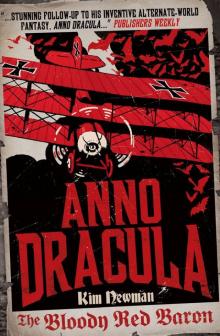 The Bloody Red Baron
The Bloody Red Baron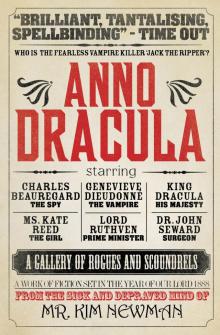 Anno Dracula
Anno Dracula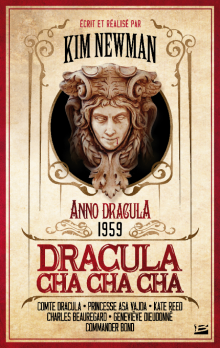 Dracula Cha Cha Cha
Dracula Cha Cha Cha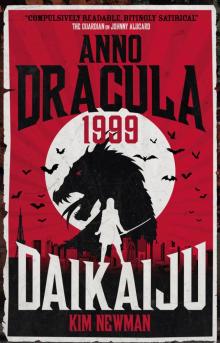 Anno Dracula 1999
Anno Dracula 1999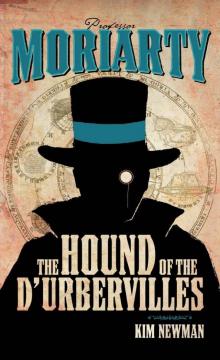 Moriarty: The Hound of the D'Urbervilles
Moriarty: The Hound of the D'Urbervilles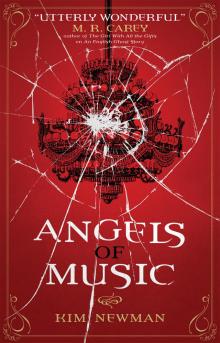 Angels of Music
Angels of Music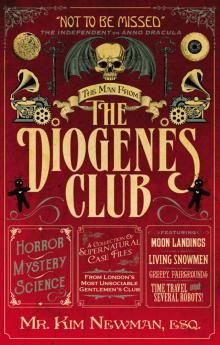 The Man From the Diogenes Club
The Man From the Diogenes Club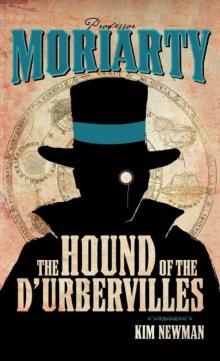 Professor Moriarty: The Hound Of The D’urbervilles
Professor Moriarty: The Hound Of The D’urbervilles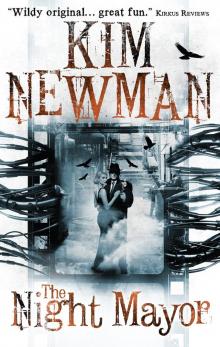 The Night Mayor
The Night Mayor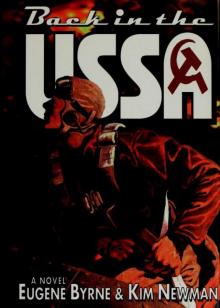 Back in the USSA
Back in the USSA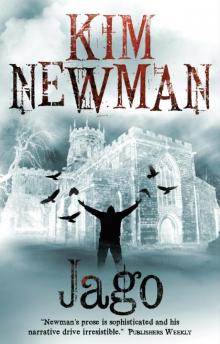 Jago
Jago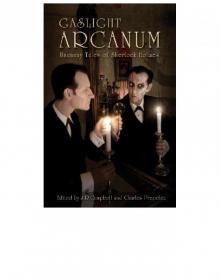 Gaslight Arcanum: Uncanny Tales of Sherlock Holmes
Gaslight Arcanum: Uncanny Tales of Sherlock Holmes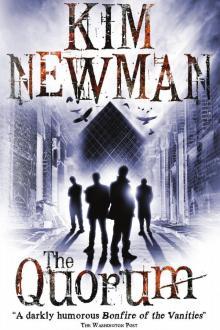 The Quorum
The Quorum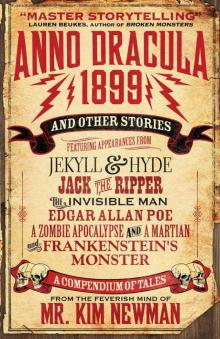 Anno Dracula 1899 and Other Stories
Anno Dracula 1899 and Other Stories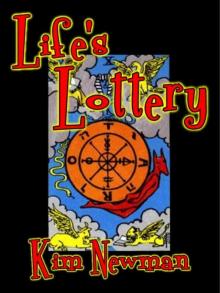 Life's Lottery
Life's Lottery The Secrets of Drearcliff Grange School
The Secrets of Drearcliff Grange School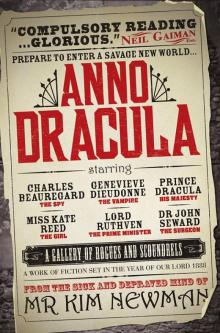 Anno Dracula ad-1
Anno Dracula ad-1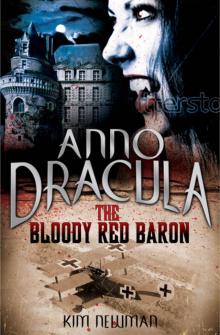 The Bloody Red Baron: 1918 ad-2
The Bloody Red Baron: 1918 ad-2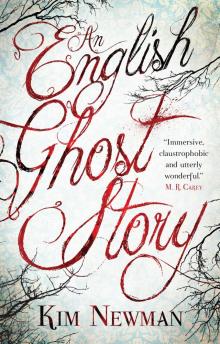 An English Ghost Story
An English Ghost Story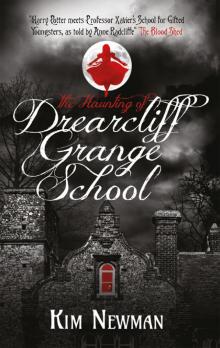 The Haunting of Drearcliff Grange School
The Haunting of Drearcliff Grange School The Other Side of Midnight
The Other Side of Midnight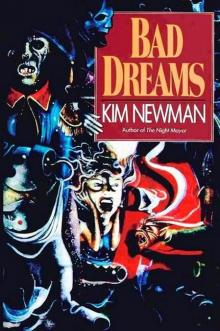 Bad Dreams
Bad Dreams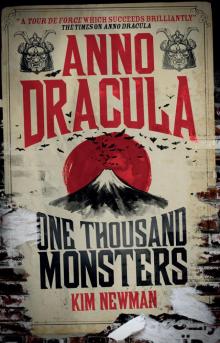 Anno Dracula--One Thousand Monsters
Anno Dracula--One Thousand Monsters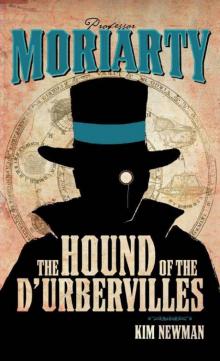 The Hound Of The D’urbervilles
The Hound Of The D’urbervilles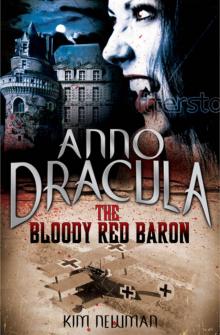 The Bloody Red Baron: Anno Dracula 1918
The Bloody Red Baron: Anno Dracula 1918